S.T.E.P. – Student Training and Education Program – Emu Project Record Book
The Emu Project Record Book is ideal for 4-H members, FFA members or anyone who has an emu and would like to keep a detailed record of their project. The record book was originally created as a part of the Texas Emu Association’s Student Training & Education Program (S.T.E.P.). This program is no longer active…
Read MoreSchool Lesson Plan now available
“The School Lesson Plan – Emus” is a new online resource for teachers. This informative overview of emus and the products they provide starts with a review of the Ratite family that includes ostrich, emu, cassowary, rhea and kiwi. This slide show guides the viewer through the many unique qualities of the emu. After the…
Read MoreEastern Equine Encephalitis (EEE) Outbreak
During the late summer and early fall of 2009 there have been numerous confirmed reports of emus with Eastern Equine Encephalitis (EEE) in the New England area and along the East coast of the United States. Winter frosts that eliminate the mosquito populations, should help to bring this threat to an end for this year.…
Read MoreEmu Production Guidelines
Guidelines for Caring for Emus print the pdf brochure Provide a Balanced Diet– A variety of feed ingredients are used in proper proportions to produce the perfect diet for emus throughout their lives. Corn, barley, milo (grain sorghum), wheat and oats are among the grains used to provide the optimal levels of dietary energy. Oilseed…
Read MoreWhat’s An Emu? – brochure
Print the pdf brochure – click here. I suppose you’re wondering… What’s an Emu? Emus are native to Australia. Emus are 5 to 6 feet tall and weigh 90-130 pounds with short, stubby wings but, they cannot fly. Emus are processed for their meat, fat, hides & feathers. Ratites are a group of mostly flightless…
Read MoreAbout Emus… – brochure
Click here to print the pdf brochure Facts for the Teacher Emus have been in Australia fr over 80 million years. Emus are members of the ratite family of birds, along with ostrich, rhea, cassowary and kiwi. Ratites have flat breastbones and no wing muscles, do they cannot fly. Emu are cursorial. They have developed…
Read MoreEmu Farmers Reminded to Vaccinate for EEE
(September 2011) With all of the hurricanes, storms and heavy rains throughout the country, mosquito season is in full swing, bringing with it the threat of mosquito-borne disease. Several outbreaks of EEE in emus have been reported in the Upper Midwest and New England. For the emu farmer, there is the danger of their flock…
Read More2011 Midwest EGGS’travaganza Winners Announced
The winners are in! (July 2011) The 2011 Midwest EGGS’travaganza Emu Egg Art Contest, sponsored by the American Emu Association (AEA), has been held and the top three emu egg “works of art” have been chosen. After several weeks on the AEA Egg Art Contest website, www.AEAEggArtContest.com , and a full day on public display…
Read MoreCharacteristic Properties of Pure Refined Emu Oil
38°F (3.3° C) Solid mass 80°F (26.6° C) Clear to light cream colored liquid Odor None to very slight oil smell Flavor No taste to bland Moisture 0.05% Maximum Refractive Index 1.4654 (30 degrees Celsius) Color Lovibond 0.8R – 8.0Y suggested Iodine Value 75 – 80 Peroxide Value (mEq/100g) 2.0 maximum OSI Stability 6.0 hours…
Read MoreComparative effects of emu and olive oil on aortic early atherosclerosis and associated risk factors in hypercholesterolemic hamsters
The comparative cholesterol lowering and antiatherosclerotic properties of emu oil and olive oil were evaluated in four groups (n = 8) of hamsters fed a nonpurified diet containing either 10% coconut oil crude and refined, emu oil, and olive oil and 0.05% cholesterol (wt/wt) for 8 weeks. Hamsters fed the olive and emu oil diets…
Read More